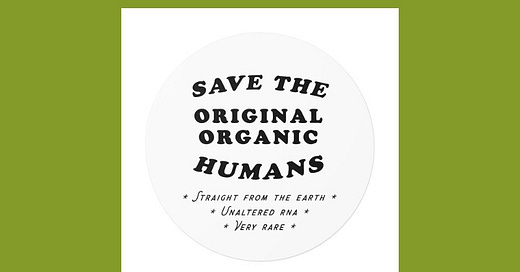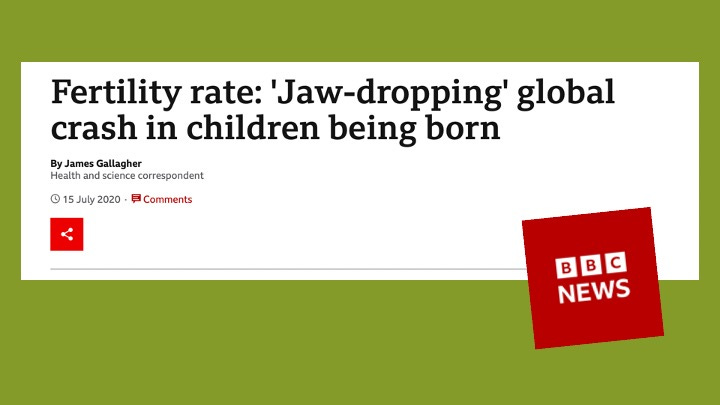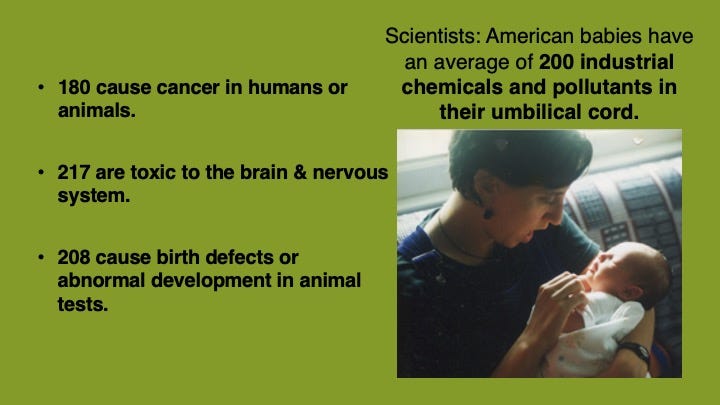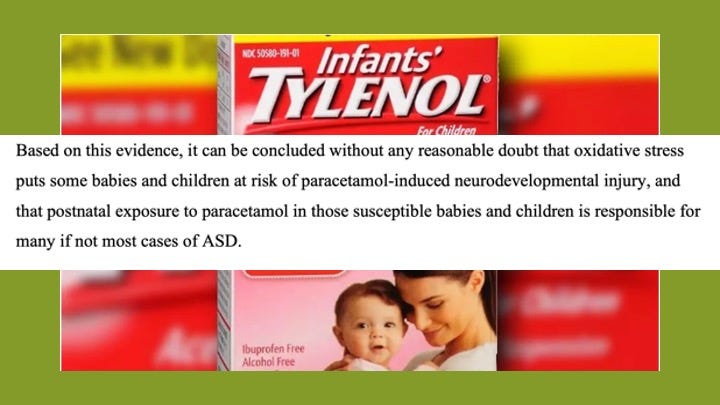On Saturday, July 30, 2022, I gave a talk in Ashland, Oregon about “How to Save the Original, Organic Humans: What Everyone Needs to Know About Healthy Conception, Pregnancy, Birth, and Lactation.”
I let the audience know since mine was the first talk of the conference and I was tasked with covering conception, pregnancy, birth, and lactation, the organizers had decided to cancel the other speakers and extend the conference to last four days.
Luckily everyone had a comfortable chair. Unfortunately for me, I had to stick to my allotted time: 45 minutes. What follows is my talk, in a greatly altered form.
So pour yourself a cup of your favorite beverage (green tea for me) and get cozy. You’ve got a lot of reading (and clicking) to do
A “Jaw-Dropping” Drop in Fertility
According to BBC News, over 20 nations—including Spain and Japan—are expected to see their populations cut in half by 2100. In 1950, women were having an average of 4.7 children. By 2100, in contrast, women are projected to have fewer than 1.7 children.
When women have fewer than 2.1 children, the size of the human population declines.
We can debate whether or not that’s a good thing. Environmentalists point out that human pollution is harming the planet, so a decline in humans might help us tread more gently on Mother Earth.
At the same time, population shrinkage carries a host of potential problems with it, including less innovation as the demand for goods and services declines, fewer workers in every sector, declining economies, more heartbreak among people who are not able to procreate, and increased loneliness.
These potential problems are why many people believe that it’s our duty to the next generation, and perhaps also to God, to have children.
Why are people having fewer children? We can only hypothesize. But the young people I’ve talked to—including some of my cousins and younger friends—tell me they are childless by choice. Or they’re following the mantra of “one and done.”
Why? Because they don’t see the point in bringing more humans into the world right now. Some tell me that they feel hopeless and they aren’t sure how long they’re going to live.
Others say haven’t been able to find partners and they don’t think it’s fair to their not-yet-conceived child to be forced to grow up in a one-parent home.
Reasons Humans Aren’t Procreating
Concern for the environment: Worried about overpopulation, many people feel that having children is environmentally irresponsible
Despair: Young people feel too much uncertainty and distress about the future Why, they wonder, should we bring more humans into such a bleak world?
Economic hardships: Many couples feel they are not financially solvent enough, they can’t “afford” to have children right now, and maybe they never will
Infertility issues: Young couples that want children are not able get pregnant. In fact, up to 19 percent of couples of childbearing age (almost 1 in 5) report suffering from infertility and not being able to get pregnant after a year of having intercourse without birth control. That’s nearly 7 million Americans a year who are trying to conceive but can’t.
Lack of interest in sex: You can’t make babies if you don’t make love. And many young people report a disinterest in having sexual intercourse in general; as well as a lack of interest in having sexual intercourse with someone of the opposite sex.
Worries about becoming a parent: One of my closest friends chose not to have children because he felt he wouldn’t, couldn’t, be a good dad. Other people are afraid that their children will suffer from the unhappiness or physical abuse they themselves experienced as children. Still others worry that their mental illness or physical ailments will negatively affect the quality of their children’s lives. They don’t want to pass down “bad genes.”
Infertility Issues
It seems that much of the population decline is not on purpose. The 7 million Americans a year who are trying to conceive and having no luck are heartbroken and stressed out. Their pockets are also rapidly emptying, as infertility treatments, often not covered by insurance, can cost couples hundreds of thousands of dollars.
At the same time, a growing body of scientific evidence links over-exposure to environmental toxins to difficulties conceiving a baby and carrying a fetus to term.
We should be concerned about any chemical, toxicant, medication, or medical intervention that contributes to infertility. Which is why I hope you will take the time to read a peer-reviewed study from June 2022 by researchers from Israel.
These scientists at three medical centers in and around Tel Aviv, Israel, studied the effects of two doses of the Pfizer COVID-19 vaccine on 37 sperm donors. As Dr. Joe Wang, a molecular geneticist, and I explored in this Epoch Times article, the Israelis found a statistically significant reduction in both sperm concentration and the total number of viable sperm in the period from 75 to 100 days after vaccination.
Other recent research links acetaminophen, the main ingredient in Tylenol, as well as other environmental toxins, to declining sperm counts and mobility. If you’d like to know more about this, I also wrote an article on this new science over at The Epoch Times
Babies Born Pre-Polluted
If you are among the lucky ones who are able to get pregnant and carry a baby to term, your baby may be born with toxin-induced health issues. Pollutants are found in pregnant and lactating women across the globe. Since 2005, we’ve known that babies are being born “pre-polluted.” The number of toxic chemicals found in the cord blood of newborn babies is staggering.
Scientists believe that the placenta protects the developing baby from environmental pollutants. The mother’s liver, too, is thought to help protect the baby from the mother’s toxic exposures.
But the mother’s placenta may not be as protective as we think. We know now that along with carrying the building blocks of life to help the organs form, the umbilical cord shuttles a steady stream of industrial chemicals, pollutants, and pesticides directly into the growing baby.
This is what toxicologists call the human "body burden" — the pollution in people that permeates everyone in the world, including babies in the womb.
Though you can’t control everything, if you know the main sources of your body burden, you can work hard to reduce it. If we all stop buying and using products that are full of toxins, we will help ourselves be healthier and create less demand for poisons.
What’s Creating This Body Burden?
If you follow me on Substack and other places, you probably know the answer to this question already. There is pollution in the air we breathe (thank you cars, coal-burning plants, industrial factories, and wildfires), as well as in the food we eat and the water we drink. We could write a whole book—and many already have—just on this. But here are some highlights:
Pesticides and herbicides: They kill unwanted “weeds” and “bugs,” and they also kill the organelles inside human cells, cause our proteins to misfold, and wreak havoc on our endocrine systems. My favorite herbicide is glyphosate! It’s used by farmers and farm workers to die by suicide. And by Big Ag to kill the rest of us slowly.
Plastics of all kinds: This stuff is ubiquitous. It’s also really bad for you, especially when you heat it up. Nuff said?
Teflon pans: That sauté pan that’s so “easy to clean” because of its non-stick surface? It contains perfluorooctanoic acid (PFOA), a chemical that’s also found in microwave popcorn and many other packaged foods. PFOA and other chemicals like it are also leeching into our drinking water. In November 2021, the Environmental Protection Agency announced that PFOA likely causes cancer and that harm to human health can occur at much lower levels than previously believed. And guess where else you may find PFOAs? In your dental floss. The joy.
Hiding inside our medications: The epidurals women are pushed to accept during labor, whether they want them or not, often contain highly addictive and toxic ingredients, including the opioid fentanyl. The number of known carcinogens, endocrine disruptors, and toxic ingredients in the currently recommended childhood vaccination schedule, as well as in vaccines for adults, is also staggering.
Tylenol Makes It All Worse
I’m sorry to tell you this if it’s the only thing that works for your headaches but Tylenol sucks beans. As my co-author Paul Thomas, M.D., likes to put it, Tylenol is an amplifier of other toxins.
It's not safe for pregnant women or small children to ever have acetaminophen. Not even a single dose.
But most doctors don’t know this, and most consumers don’t either.
Keep reading with a 7-day free trial
Subscribe to Vibrant Life to keep reading this post and get 7 days of free access to the full post archives.






